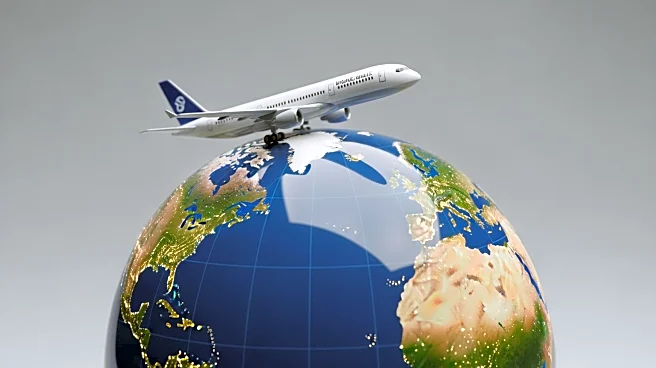What's Happening?
American Airlines CEO Robert Isom has expressed concerns over the impact of the ongoing government shutdown on holiday travel bookings. The shutdown, now in its 39th day, has led to staffing shortages in the Federal Aviation Administration (FAA), prompting
the agency to order airlines to reduce air traffic. This reduction has resulted in American Airlines canceling over 200 flights out of 6,200 scheduled on Friday, primarily affecting smaller aircraft and lower frequency routes. The leisure and hospitality sector, which employs over 17 million people, is particularly vulnerable to these disruptions. The shortage of air traffic controllers, who are working without pay, has led to increased sick calls as they seek secondary jobs, exacerbating the staffing crunch.
Why It's Important?
The government shutdown's impact on air travel is significant, as it threatens to disrupt the peak holiday travel season, affecting millions of travelers and the broader economy. The leisure and hospitality sector, a major employer, faces potential job losses and economic strain due to flight cancellations. The reduction in air traffic, ordered by the FAA, could lead to further cancellations, affecting airlines like United, Delta, and American Airlines. The situation underscores the critical role of government operations in maintaining essential services and the potential economic fallout from prolonged shutdowns.
What's Next?
If the government shutdown continues, federal aviation employees are set to miss their second paycheck, which could lead to further staffing reductions. The FAA plans to incrementally reduce air traffic by up to 10% by next week, potentially increasing flight cancellations. Airlines and travelers may face more disruptions, and the leisure and hospitality sector could experience further economic impacts. The resolution of the government shutdown is crucial to restoring normal operations and preventing further economic damage.
Beyond the Headlines
The government shutdown highlights the vulnerability of essential services to political impasses and the broader implications for economic stability. The reliance on federal employees for critical operations like air traffic control underscores the need for contingency planning and the potential risks of prolonged government closures. The situation may prompt discussions on safeguarding essential services from political disruptions in the future.
















